专题05 介词---备考2023中考英语二轮高频考点剖析 课件(共23张PPT)
文档属性
| 名称 | 专题05 介词---备考2023中考英语二轮高频考点剖析 课件(共23张PPT) |  | |
| 格式 | zip | ||
| 文件大小 | 2.0MB | ||
| 资源类型 | 试卷 | ||
| 版本资源 | 通用版 | ||
| 科目 | 英语 | ||
| 更新时间 | 2023-02-02 14:13:39 | ||
图片预览



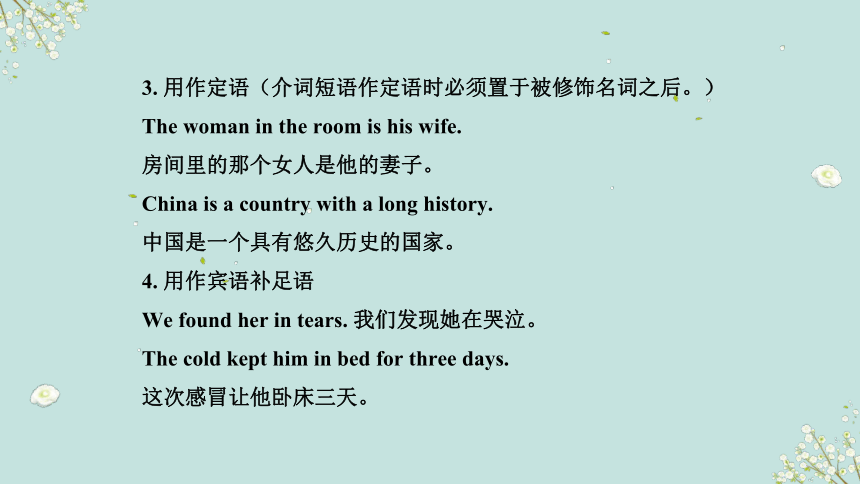
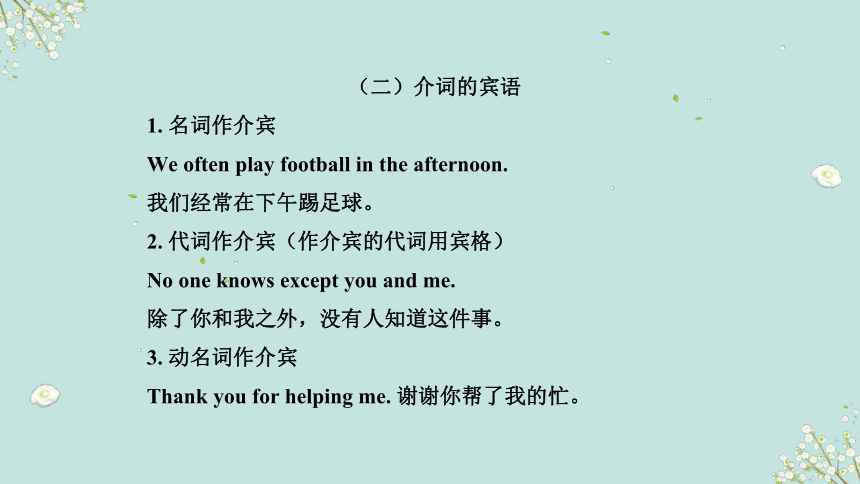
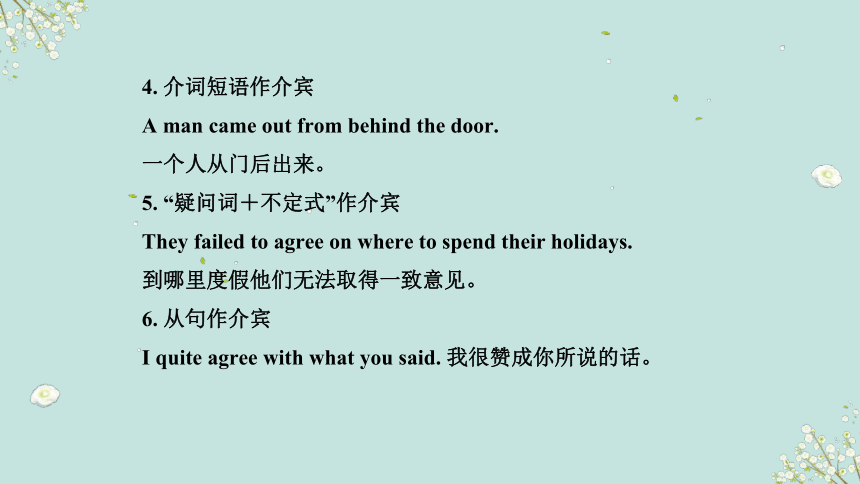
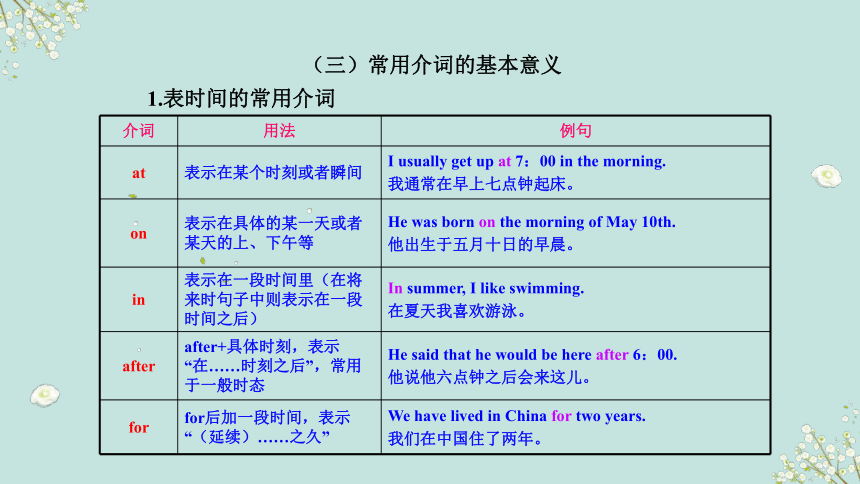
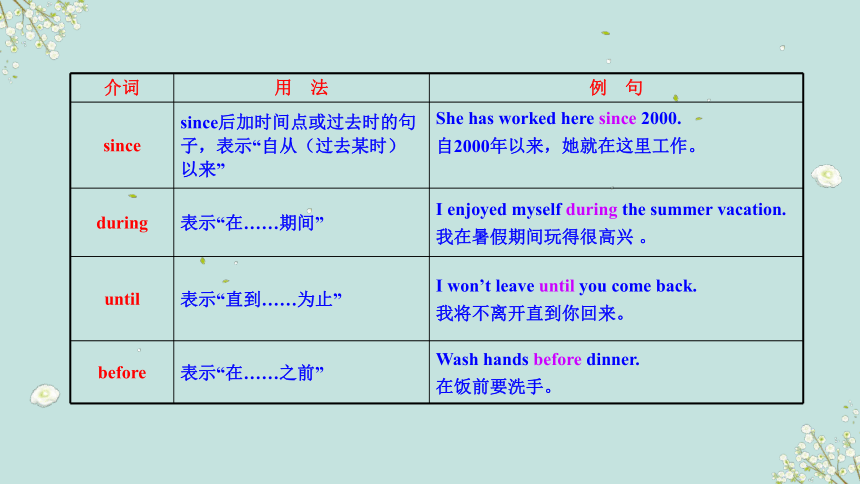
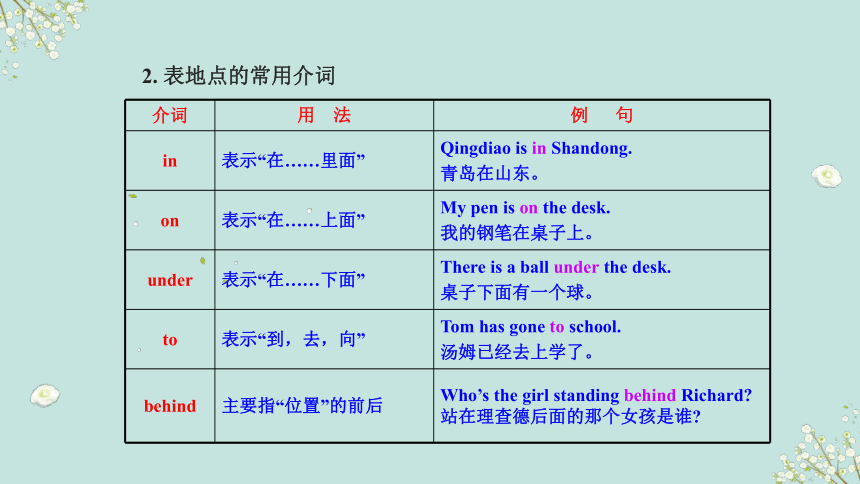
文档简介
(共23张PPT)
介词
备考2023中考英语二轮高频考点剖析学案
介词是一种“媒介”,是表示句中某一个词或短语与另一个词或短语的关系的词。在英语中介词的功能十分强大,介词是虚词,不能单独作句子成分,而是用来表示名词或代词等和句中其他词之间的关系,通常放在名词或代词之前,构成介词短语。
(一) 介词短语的功能
1. 用作表语
Mr. Smith is still in bed. 史密斯先生还在睡觉。
Dinner was at one o’clock. 一点钟开晚饭。
2. 用作状语
The children are playing by the river. 孩子们在河边玩。
They often talk in English after class.
他们经常在课后用英语交谈。
3. 用作定语(介词短语作定语时必须置于被修饰名词之后。)
The woman in the room is his wife.
房间里的那个女人是他的妻子。
China is a country with a long history.
中国是一个具有悠久历史的国家。
4. 用作宾语补足语
We found her in tears. 我们发现她在哭泣。
The cold kept him in bed for three days.
这次感冒让他卧床三天。
(二)介词的宾语
1. 名词作介宾
We often play football in the afternoon.
我们经常在下午踢足球。
2. 代词作介宾(作介宾的代词用宾格)
No one knows except you and me.
除了你和我之外,没有人知道这件事。
3. 动名词作介宾
Thank you for helping me. 谢谢你帮了我的忙。
4. 介词短语作介宾
A man came out from behind the door.
一个人从门后出来。
5. “疑问词+不定式”作介宾
They failed to agree on where to spend their holidays.
到哪里度假他们无法取得一致意见。
6. 从句作介宾
I quite agree with what you said. 我很赞成你所说的话。
(三)常用介词的基本意义
1.表时间的常用介词
介词 用法 例句
at 表示在某个时刻或者瞬间 I usually get up at 7:00 in the morning.
我通常在早上七点钟起床。
on 表示在具体的某一天或者某天的上、下午等 He was born on the morning of May 10th.
他出生于五月十日的早晨。
in 表示在一段时间里(在将来时句子中则表示在一段时间之后) In summer, I like swimming.
在夏天我喜欢游泳。
after after+具体时刻,表示“在……时刻之后”,常用于一般时态 He said that he would be here after 6:00.
他说他六点钟之后会来这儿。
for for后加一段时间,表示“(延续)……之久” We have lived in China for two years.
我们在中国住了两年。
介词 用 法 例 句
since since后加时间点或过去时的句子,表示“自从(过去某时)以来” She has worked here since 2000.
自2000年以来,她就在这里工作。
during 表示“在……期间” I enjoyed myself during the summer vacation.
我在暑假期间玩得很高兴 。
until 表示“直到……为止” I won’t leave until you come back.
我将不离开直到你回来。
before 表示“在……之前” Wash hands before dinner.
在饭前要洗手。
介词 用 法 例 句
in 表示“在……里面” Qingdiao is in Shandong.
青岛在山东。
on 表示“在……上面” My pen is on the desk.
我的钢笔在桌子上。
under 表示“在……下面” There is a ball under the desk.
桌子下面有一个球。
to 表示“到,去,向” Tom has gone to school.
汤姆已经去上学了。
behind 主要指“位置”的前后 Who’s the girl standing behind Richard 站在理查德后面的那个女孩是谁
2. 表地点的常用介词
介词 用 法 例 句
above 表示“在……上方”,它表示上下的位置关系,与below相对 The plane is flying high above the
clouds. 飞机正飞翔在云彩之上。
over 表示“(垂直地)在……上方”,与under相对 A bridge is over the river.
在河上有一座桥。
between 多用于两者之间 This is a secret between you and me.
这是你和我之间的秘密。
among 指在三者或在三者以上的对象之间 —How do you like the book
——你觉得这本书怎么样?
—It’s the best among detective novels.
——它是侦探小说中最好的。
through 表示从中间“穿过,贯 穿”,表示动作发生在立 体空间,是从内部穿过 Is the street too narrow for the bus to go through
汽车通过这条街道是不是太窄了?
介词 用 法 例 句
across 表示从表面“横穿” A bus is going across the street.
一辆公共汽车正横穿马路。
beside 表示“在……旁边” My bike is beside Tom’s.
我的自行车在汤姆自行车旁边。
介词 用 法 例 句
by 1. by+表示交通工具的名词,表示“乘……(交通工具)” He goes to school by bike.
他骑自行车去上学。
2. by+ v.-ing形式,表示“通过……方式” He learns English by listening to the radio.
他通过听收音机学英语。
in in+语言类名词,表示“用……语言” Please say it in English.
请用英语说它。
on on+ radio/TV通过收音机/电视 He listens to music on the radio.
他通过收音机听音乐。
with 1. with the help of…表示“在……的帮助下” With the help of him, I won the game.
在他的帮助下,我赢得了比赛。
2. 表示“用” Cut the bag with the knife.
用刀子割开这个包。
3. 表示方式的常用介词
介词 用 法 例 句
about about多用于在内容和观点上比较一般性的情况 What is your excuse about your
being late yesterday
关于昨天迟到你的借口是什么?
on on 多表示属于专门性的内容,是严肃的和学术性的 It’s a book on animals.
这是一本论及动物的书。(学术专著)
like 意为“像……一样”用于说明相似关系,实际上不是 He talked to me like my father.
他像父亲那样跟我谈话。(他
不是我父亲。)
as 意为“作为,以……的身 份”后跟表示职业、职 务的名词 He talked to me as a father.
他以父亲的身份跟我说话。
(他是我父亲)
介词 用 法 例 句
except 表示“除……之外”,是从整体中除去一部分,含有“减”的意思,属于否定形式 We are all here except Li Ming
because he is ill.
除了李明,我们都在这里,因为他生病了。
besides 表示“除……之外”(还有,其余都相同),含有“加”的意思,属于肯定形式 This time we’ll all go there besides Tom.
这次除了Tom我们都将去那里。(意思是Tom也去)
into “往……里(进、蹦、跳)去”常和动词连用 Many frogs jumped into the lake.
许多青蛙跳进了湖里。
with 表示伴随,“和……一起” He came in with a book in his hand.
他进来了,手里拿着一本书。
without “没有”,用作状语 He left without saying a word.
他什么也没有说就离开了。
for 表示目的,“为了” Let’s go for a walk.让我们去散散步。
模拟演练
1. I go to school _____ bus every morning.
A. in B. on C. at D. by
【解析】选D。by + 交通工具,表示“乘坐……”且by与交通
工具之间不加任何词。此外如用介词on应该加上冠词the,
即“on the bus”。故选D。
2.—I joined the League _____ May, 2009. What about you
—I’ve been a League member _____ three years.
A. in; for B. on; in C. on; for D. in; since
【解析】选A。考查时间介词的用法。“May, 2009” 意思为
“2009年5月”,故应选介词“in”;由答语“我是团员已经3年
了”可知,此处应是“for +一段时间”,故选A。
3. We couldn’t finish our work so early _____ your help.
A. without B. with C. for D. By
【解析】选A。句意:没有你的帮助我们不能这么早完成我们的工作。without“没有”,是否定介词。
4. Shanghai Disneyland has started to be built and it will be open _____ five years.
A. in B. for C. from D. before
【解析】选A。“in+一段时间”用于一般将来时。
5. John is standing _____ Gina and Jim.
A. at B. during C. between D. in
【解析】选C。句意:约翰正站在吉娜和吉姆之间。between…and为固定搭配,意为“在……(两者)之间”。故选C。
6.—Your sweater looks nice, is it made of wool
—Yes, and it’s made _____ Shanghai.
A. by B. in C. for D. from
【解析】选B。 “be made in+地点”意为“某地制造”。
7.—Why are you standing there, Maggie
—I can’t see the blackboard clearly. Two tall boys are sitting _____ me.
A. behind B. in front of C. beside D. after
【解析】选B。behind“在……后面”;in front of“在……前面”;beside“在……旁边”。由题意可知答案选B。
8. Bonnie looks very smart and is always _____ pink because pink is her favourite colour.
A. with B. on C. about D. in
【解析】选D。“in+颜色”表示穿着一件某种颜色的衣服。故选D。
9.—What does your English teacher look like
— She’s tall and thin _____ long hair.
A. have B. has C. there is D. with
【解析】选D。with在此意为“带着;具有”。
10.—How do you study for a test
— _____ working with friends.
A. By B. With C. On D. For
【解析】选A。by+ v.-ing意为“通过某种方式”。
11. The moonlight goes _____ the window and makes the room bright.
A. across B. through C. over D. in
【解析】选B 。句意:月光穿过窗户并使房间明亮。across是从事物的表面穿过;through是从物体的内部穿过;over强调从上面越过。故选B。
12.— I think drinking milk is good _____ our health.
—Yes, I agree _____ you.
A. with; to B. to ; to C. at; with D. for; with
【解析】选D。be good for“对……有好处”;agree with sb.“同意某人”。故答案为D。
13. We’ll have dinner at Qianxilong Restaurant, which is famous _____ its seafood.
A. of B. to C. for D. as
【解析】选C。be famous for “以……而著/闻名”。
14.—Who else do you know at the party _____ Jim and
Tom
—Lucy and Lily.
A. in B. next C. among D. besides
【解析】选D。——句意:你知道在晚会上除吉姆与汤姆之外的其他的人是谁?——是露西与莉莉。besides “除……之外”,故选D。
15. I wrote _____ my brother last Saturday, but I haven’t heard _____ him up to now.
A. from; to B. to; of C. to; to D. to ; from
【解析】选D。write to sb.“给某人写信”;hear from“收到某人的信”。故选D。
介词
备考2023中考英语二轮高频考点剖析学案
介词是一种“媒介”,是表示句中某一个词或短语与另一个词或短语的关系的词。在英语中介词的功能十分强大,介词是虚词,不能单独作句子成分,而是用来表示名词或代词等和句中其他词之间的关系,通常放在名词或代词之前,构成介词短语。
(一) 介词短语的功能
1. 用作表语
Mr. Smith is still in bed. 史密斯先生还在睡觉。
Dinner was at one o’clock. 一点钟开晚饭。
2. 用作状语
The children are playing by the river. 孩子们在河边玩。
They often talk in English after class.
他们经常在课后用英语交谈。
3. 用作定语(介词短语作定语时必须置于被修饰名词之后。)
The woman in the room is his wife.
房间里的那个女人是他的妻子。
China is a country with a long history.
中国是一个具有悠久历史的国家。
4. 用作宾语补足语
We found her in tears. 我们发现她在哭泣。
The cold kept him in bed for three days.
这次感冒让他卧床三天。
(二)介词的宾语
1. 名词作介宾
We often play football in the afternoon.
我们经常在下午踢足球。
2. 代词作介宾(作介宾的代词用宾格)
No one knows except you and me.
除了你和我之外,没有人知道这件事。
3. 动名词作介宾
Thank you for helping me. 谢谢你帮了我的忙。
4. 介词短语作介宾
A man came out from behind the door.
一个人从门后出来。
5. “疑问词+不定式”作介宾
They failed to agree on where to spend their holidays.
到哪里度假他们无法取得一致意见。
6. 从句作介宾
I quite agree with what you said. 我很赞成你所说的话。
(三)常用介词的基本意义
1.表时间的常用介词
介词 用法 例句
at 表示在某个时刻或者瞬间 I usually get up at 7:00 in the morning.
我通常在早上七点钟起床。
on 表示在具体的某一天或者某天的上、下午等 He was born on the morning of May 10th.
他出生于五月十日的早晨。
in 表示在一段时间里(在将来时句子中则表示在一段时间之后) In summer, I like swimming.
在夏天我喜欢游泳。
after after+具体时刻,表示“在……时刻之后”,常用于一般时态 He said that he would be here after 6:00.
他说他六点钟之后会来这儿。
for for后加一段时间,表示“(延续)……之久” We have lived in China for two years.
我们在中国住了两年。
介词 用 法 例 句
since since后加时间点或过去时的句子,表示“自从(过去某时)以来” She has worked here since 2000.
自2000年以来,她就在这里工作。
during 表示“在……期间” I enjoyed myself during the summer vacation.
我在暑假期间玩得很高兴 。
until 表示“直到……为止” I won’t leave until you come back.
我将不离开直到你回来。
before 表示“在……之前” Wash hands before dinner.
在饭前要洗手。
介词 用 法 例 句
in 表示“在……里面” Qingdiao is in Shandong.
青岛在山东。
on 表示“在……上面” My pen is on the desk.
我的钢笔在桌子上。
under 表示“在……下面” There is a ball under the desk.
桌子下面有一个球。
to 表示“到,去,向” Tom has gone to school.
汤姆已经去上学了。
behind 主要指“位置”的前后 Who’s the girl standing behind Richard 站在理查德后面的那个女孩是谁
2. 表地点的常用介词
介词 用 法 例 句
above 表示“在……上方”,它表示上下的位置关系,与below相对 The plane is flying high above the
clouds. 飞机正飞翔在云彩之上。
over 表示“(垂直地)在……上方”,与under相对 A bridge is over the river.
在河上有一座桥。
between 多用于两者之间 This is a secret between you and me.
这是你和我之间的秘密。
among 指在三者或在三者以上的对象之间 —How do you like the book
——你觉得这本书怎么样?
—It’s the best among detective novels.
——它是侦探小说中最好的。
through 表示从中间“穿过,贯 穿”,表示动作发生在立 体空间,是从内部穿过 Is the street too narrow for the bus to go through
汽车通过这条街道是不是太窄了?
介词 用 法 例 句
across 表示从表面“横穿” A bus is going across the street.
一辆公共汽车正横穿马路。
beside 表示“在……旁边” My bike is beside Tom’s.
我的自行车在汤姆自行车旁边。
介词 用 法 例 句
by 1. by+表示交通工具的名词,表示“乘……(交通工具)” He goes to school by bike.
他骑自行车去上学。
2. by+ v.-ing形式,表示“通过……方式” He learns English by listening to the radio.
他通过听收音机学英语。
in in+语言类名词,表示“用……语言” Please say it in English.
请用英语说它。
on on+ radio/TV通过收音机/电视 He listens to music on the radio.
他通过收音机听音乐。
with 1. with the help of…表示“在……的帮助下” With the help of him, I won the game.
在他的帮助下,我赢得了比赛。
2. 表示“用” Cut the bag with the knife.
用刀子割开这个包。
3. 表示方式的常用介词
介词 用 法 例 句
about about多用于在内容和观点上比较一般性的情况 What is your excuse about your
being late yesterday
关于昨天迟到你的借口是什么?
on on 多表示属于专门性的内容,是严肃的和学术性的 It’s a book on animals.
这是一本论及动物的书。(学术专著)
like 意为“像……一样”用于说明相似关系,实际上不是 He talked to me like my father.
他像父亲那样跟我谈话。(他
不是我父亲。)
as 意为“作为,以……的身 份”后跟表示职业、职 务的名词 He talked to me as a father.
他以父亲的身份跟我说话。
(他是我父亲)
介词 用 法 例 句
except 表示“除……之外”,是从整体中除去一部分,含有“减”的意思,属于否定形式 We are all here except Li Ming
because he is ill.
除了李明,我们都在这里,因为他生病了。
besides 表示“除……之外”(还有,其余都相同),含有“加”的意思,属于肯定形式 This time we’ll all go there besides Tom.
这次除了Tom我们都将去那里。(意思是Tom也去)
into “往……里(进、蹦、跳)去”常和动词连用 Many frogs jumped into the lake.
许多青蛙跳进了湖里。
with 表示伴随,“和……一起” He came in with a book in his hand.
他进来了,手里拿着一本书。
without “没有”,用作状语 He left without saying a word.
他什么也没有说就离开了。
for 表示目的,“为了” Let’s go for a walk.让我们去散散步。
模拟演练
1. I go to school _____ bus every morning.
A. in B. on C. at D. by
【解析】选D。by + 交通工具,表示“乘坐……”且by与交通
工具之间不加任何词。此外如用介词on应该加上冠词the,
即“on the bus”。故选D。
2.—I joined the League _____ May, 2009. What about you
—I’ve been a League member _____ three years.
A. in; for B. on; in C. on; for D. in; since
【解析】选A。考查时间介词的用法。“May, 2009” 意思为
“2009年5月”,故应选介词“in”;由答语“我是团员已经3年
了”可知,此处应是“for +一段时间”,故选A。
3. We couldn’t finish our work so early _____ your help.
A. without B. with C. for D. By
【解析】选A。句意:没有你的帮助我们不能这么早完成我们的工作。without“没有”,是否定介词。
4. Shanghai Disneyland has started to be built and it will be open _____ five years.
A. in B. for C. from D. before
【解析】选A。“in+一段时间”用于一般将来时。
5. John is standing _____ Gina and Jim.
A. at B. during C. between D. in
【解析】选C。句意:约翰正站在吉娜和吉姆之间。between…and为固定搭配,意为“在……(两者)之间”。故选C。
6.—Your sweater looks nice, is it made of wool
—Yes, and it’s made _____ Shanghai.
A. by B. in C. for D. from
【解析】选B。 “be made in+地点”意为“某地制造”。
7.—Why are you standing there, Maggie
—I can’t see the blackboard clearly. Two tall boys are sitting _____ me.
A. behind B. in front of C. beside D. after
【解析】选B。behind“在……后面”;in front of“在……前面”;beside“在……旁边”。由题意可知答案选B。
8. Bonnie looks very smart and is always _____ pink because pink is her favourite colour.
A. with B. on C. about D. in
【解析】选D。“in+颜色”表示穿着一件某种颜色的衣服。故选D。
9.—What does your English teacher look like
— She’s tall and thin _____ long hair.
A. have B. has C. there is D. with
【解析】选D。with在此意为“带着;具有”。
10.—How do you study for a test
— _____ working with friends.
A. By B. With C. On D. For
【解析】选A。by+ v.-ing意为“通过某种方式”。
11. The moonlight goes _____ the window and makes the room bright.
A. across B. through C. over D. in
【解析】选B 。句意:月光穿过窗户并使房间明亮。across是从事物的表面穿过;through是从物体的内部穿过;over强调从上面越过。故选B。
12.— I think drinking milk is good _____ our health.
—Yes, I agree _____ you.
A. with; to B. to ; to C. at; with D. for; with
【解析】选D。be good for“对……有好处”;agree with sb.“同意某人”。故答案为D。
13. We’ll have dinner at Qianxilong Restaurant, which is famous _____ its seafood.
A. of B. to C. for D. as
【解析】选C。be famous for “以……而著/闻名”。
14.—Who else do you know at the party _____ Jim and
Tom
—Lucy and Lily.
A. in B. next C. among D. besides
【解析】选D。——句意:你知道在晚会上除吉姆与汤姆之外的其他的人是谁?——是露西与莉莉。besides “除……之外”,故选D。
15. I wrote _____ my brother last Saturday, but I haven’t heard _____ him up to now.
A. from; to B. to; of C. to; to D. to ; from
【解析】选D。write to sb.“给某人写信”;hear from“收到某人的信”。故选D。
同课章节目录
- 词法
- 名词
- 动词和动词短语
- 动词语态
- 动词时态
- 助动词和情态动词
- 非谓语动词
- 冠词
- 代词
- 数词和量词
- 形容词副词及其比较等级
- 介词和介词短语
- 连词和感叹词
- 构词法
- 相似、相近词比较
- 句法
- 陈述句
- 一般疑问句和否定疑问句
- 特殊疑问句及选择疑问句
- 反意疑问句
- 存在句(There be句型)
- 宾语从句
- 定语从句
- 状语从句
- 主谓一致问题
- 简单句
- 并列句
- 复合句
- 主谓一致
- 主、表语从句
- 名词性从句
- 直接引语和间接引语
- 虚拟语气
- 感叹句
- 强调句
- 倒装句
- 祈使句
- 句子的成分
- 句子的分类
- 题型专区
- 单项选择部分
- 易错题
- 完形填空
- 阅读理解
- 词汇练习
- 听说训练
- 句型转换
- 补全对话
- 短文改错
- 翻译
- 书面表达
- 任务型阅读
- 语法填空
- 其他资料
